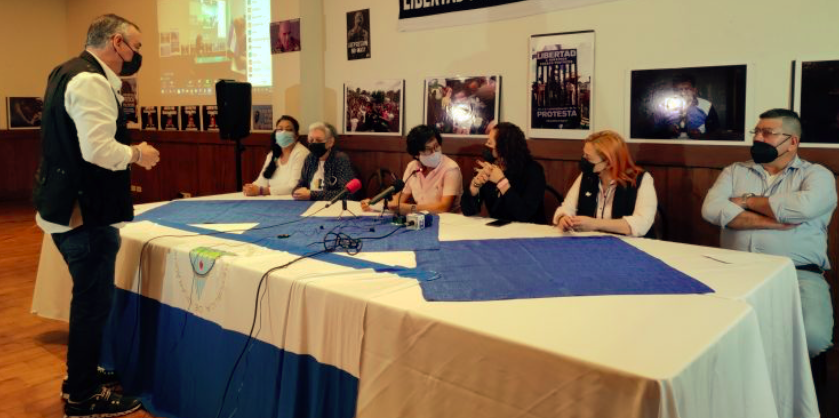RIO DE JANEIRO, BRAZIL – Exiled opposition leaders in Costa Rica asked the international community this Thursday to ignore the results of the elections of next November 7 in Nicaragua, considering the process as a “farce” orchestrated by the Government of Daniel Ortega to remain in power.
One month before the elections, the National Blue and White Unity, the Nicaraguan Democratic Front, the Initiative for Change, the Peasant Movement, the Articulation of Social Movements, and the Renewing Democratic Union, as well as leaders in exile, signed a declaration rejecting the “electoral farce” which is taking place in a context of imprisonment of opposition candidates.
Read also: Check out our coverage on Nicaragua
In the document, read at a press conference held in Costa Rica, the movements call on the countries of the Central American Integration System (SICA), the Organization of American States (OAS), the European Union, and in general “all democratic countries of the world” to “declare the illegitimacy of the electoral process and to reject the results of the electoral farce staged by the dictatorship”.

The document calls for the application of the OAS Democratic Charter to Nicaragua and the international community to increase sanctions against the Ortega government and condition the approval of financial resources to respect human rights.
“We declare our unanimous repudiation and disavowal of the electoral farce that culminates on November 7. It is an illegitimate and null process in which the people are prevented from democratically electing their authorities”, stated the leader of the National Blue and White Unity, María Laura Alvarado.
In the next elections, Ortega, who has been in power since 2007, seeks to be reelected for five more years with his wife and vice-president, Rosario Murillo.
In the joint declaration, the organizations demand the release of political prisoners and that the safe return of exiles is guaranteed.
At least 155 opponents, considered by humanitarian organizations as “political prisoners”, are being held in prison in Nicaragua, including 145 who were captured following the social outburst of April 2018, according to the Mechanism for the Recognition of Political Prisoners, an observatory whose data is endorsed by the Inter-American Commission on Human Rights (IACHR).
The list includes the 37 opposition leaders and independent professionals captured in the upcoming November 7 elections. There are seven aspiring presidential candidates for the opposition, high-ranking officials of previous governments, and former Sandinista guerrillas.
COSTA RICA, HOME, AND BASE FOR THOUSANDS OF EXILES
Historically, Costa Rica has been home to thousands of Nicaraguans who have fled their country in contexts of war, political persecution, or in search of better living conditions. According to official data, some 400,000 Nicaraguans live in this country with 5.1 million inhabitants, although non-governmental organizations estimate that the actual figure may be double.
Since the outbreak of the socio-political crisis in 2018, Costa Rica has received more than 100,000 refugee applications from Nicaraguans, according to figures from the Migration Directorate. There is no specific number of people who could be unstable and enter through the numerous blind spots on the extensive border between the two countries.
Among the thousands of exiles in Costa Rica are peasants, social leaders, doctors, journalists, and well-known figures such as the award-winning writer Sergio Ramirez.
In recent months, Costa Rica has been the scene of marches and protests against the Ortega government by exiles demanding a return to democracy in their country and an end to repression against opponents.
The 2018 protests, described by the Executive as an “attempted coup d’état”, left at least 328 dead, according to the IACHR, although local agencies raised the figure to 684, and the Government recognizes 200.
In the last few weeks, coalitions of exile organizations, human rights organizations, and social and political groups have been formed in Costa Rica, such as this Thursday.
These groups have announced that they will continue to demand from Costa Rica free and democratic elections and the departure of Ortega from power.

